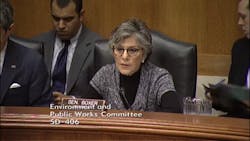The Senate Environment and Public Works (EPW) Committee on May 15 approved with only minor amendments legislation (S.2322) to reauthorize the 2012 highway program act known as MAP-21 for six years under current inflation-adjusted funding levels. While the infrastructure-related provisions are now ready for consideration by the full Senate, other key titles must be approved first by other committees, including motor carrier provisions by the Senate Commerce Committee and financing provisions by the Senate Finance Committee and Senate Banking Committee.
The EPW Committee’s vote was unanimous, and the bill is fundamentally unchanged from the version introduced May 12 by the committee’s bipartisan leadership. Indeed, in a committee meeting that ran about an hour, the panel spent only about a minute actually doing anything official. The rest of the time was spent on “opening statements,” although several of those statements came after the committee officially voted.
The committee adopted as one amendment a package of minor, technical and non-controversial changes to the bill that had been requested by various senators and then approved the bill without objection.
EPW Committee Chairman Barbara Boxer (D-Calif.) acknowledged that the lack of controversy was by design in order to move the bill expeditiously to the Senate floor and that the more contentious measures likely would be offered as amendments there. One such measure could be to allow tolling of existing Interstate highways as proposed by the Obama administration.
One of the most important aspects of S. 2322 is its six-year term, Boxer said. “A short-term extension bill only extends the uncertainty.”
The financing component is even more critical, however, as the Dept. of Transportation projects that the highway trust fund will run out of money in August.
Boxer noted that several ideas floated for financing increased transportation infrastructure needs included replacing the current cents-per-gallon tax with a sales tax based on the wholesale price of fuel; using revenue generated from reforming the tax code; or indexing the fuel tax to inflation – an approach that has been endorsed by the U.S. Chamber of Commerce, AAA and the American Trucking Assns.
Speaking at an infrastructure forum on May 13 sponsored by ATA and the Assn. of American Railroads, Sen. Thomas Carper (D-DE) – a member of both EPW and Finance – endorsed the idea of phasing higher taxes at levels representing current levels adjusted for inflation since 1993 and then indexing the taxes for inflation.
In keeping with its efforts on other issues, the Obama administration is looking for ways to improve infrastructure that don’t depend on Congressional action. On May 15, President Obama announced that he was fast-tracking federal permitting for certain major projects.
